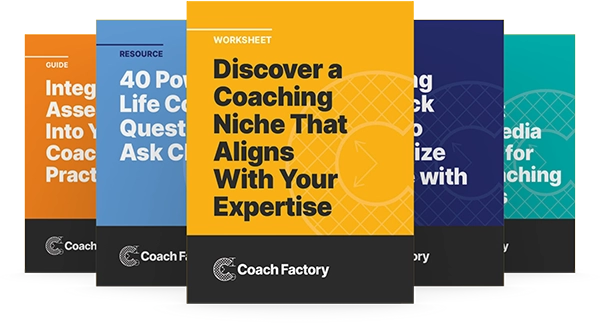Are you tired of the feast and famine that commonly affects online coaches? One minute, you have a full coaching calendar, and in the blink of an eye, you’re scrounging to find new clients. It’s a vicious cycle that can leave you feeling burned out and defeated.
But imagine having a system that transitions new prospects from a curious click online into a steady flow of loyal clients. To sweeten the deal, what if this system were automatic?
Luckily, it exists in the AIDA framework: awareness, interest, decision, and action.
This article guides you on online marketing funnels for coaches and how they fuel coaching businesses with consistent clientele. Be sure to get the free template in the Coach Factory Resource Library, so you can easily apply these principles to your own venture.
What Is a Marketing Funnel for Coaches?
A marketing funnel is a model that maps a client’s journey from the initial point of awareness about a product or service through purchasing to overall client loyalty. For illustration, a marketing funnel shows a broad entry point representing a wide audience. The funnel gradually narrows to symbolize the sequential stages of a client’s journey, where prospects filter through various phases of decision-making and engagement. Eventually, a small portion of these prospects get converted into clients.
… be strategic about the kind of marketing activities that you do. It’s not about doing everything all the time. It’s about choosing the specific marketing vehicles that work for you that you notice over time get you a consistent flow of clients.
Pamela Slim on the Coach Factory Podcast
Four Benefits of a Coaching Funnel
In the coaching business, a marketing funnel guides the route consumers navigate to convert from potential leads to loyal clients. It allows a coaching business to categorize, comprehend, and cater to prospects at each phase. The goal is to foster lead generation, improve client engagement, create systematic sales processes, and create custom customer journeys.
Here are the top four benefits of having a digital marketing funnel for your coaching business.
1. Organizes and monitors the client journey
The marketing funnel equips coaching businesses with the ability to manage various stages within a client’s journey. From an initial visitor to a brand promoter, each phase of the client’s interaction works meticulously to monitor client interactions, behaviors, and feedback at each stage. This structured approach enables businesses to adapt marketing strategies to enhance effectiveness and efficiency.
2. Increases sales conversions
A good marketing funnel should guide potential clients toward making a purchasing decision. It effectively nudges customers through each phase, targeting their specific needs, questions, and objections to propel them towards conversion. This strategic approach ensures that every interaction and piece of content amplifies revenue.
3. Predicts client acquisition
With a systematic approach to client acquisition, coaching businesses benefit from predictability. Through consistent application and data analysis, the marketing funnel aids in predicting trends, analyzing customer behaviors, and forecasting revenue with increased accuracy to drive more informed decisions and resource allocations.
4. Enhances client experience
Marketing funnels for coaches significantly elevate the client experience. It ensures that client interactions are smooth and value-driven. This system forges a path that seamlessly guides them from curiosity to purchase — ensuring clarity, engagement, and value at every touch point.
The Four Stages of the AIDA Marketing Funnel for Coaching Businesses
To set up a full-funnel strategy for marketing your coaching business, the AIDA framework is incredibly helpful: awareness, interest, decision, and action. At each stage, the audience shrinks, eliminating the people who don’t match your ideal client persona while leaving those who are a perfect fit. Your job with the marketing funnel is to cast a wide net and then let potential clients sort themselves as they interact with your social shares, ads, emails, free webinars, and groups.
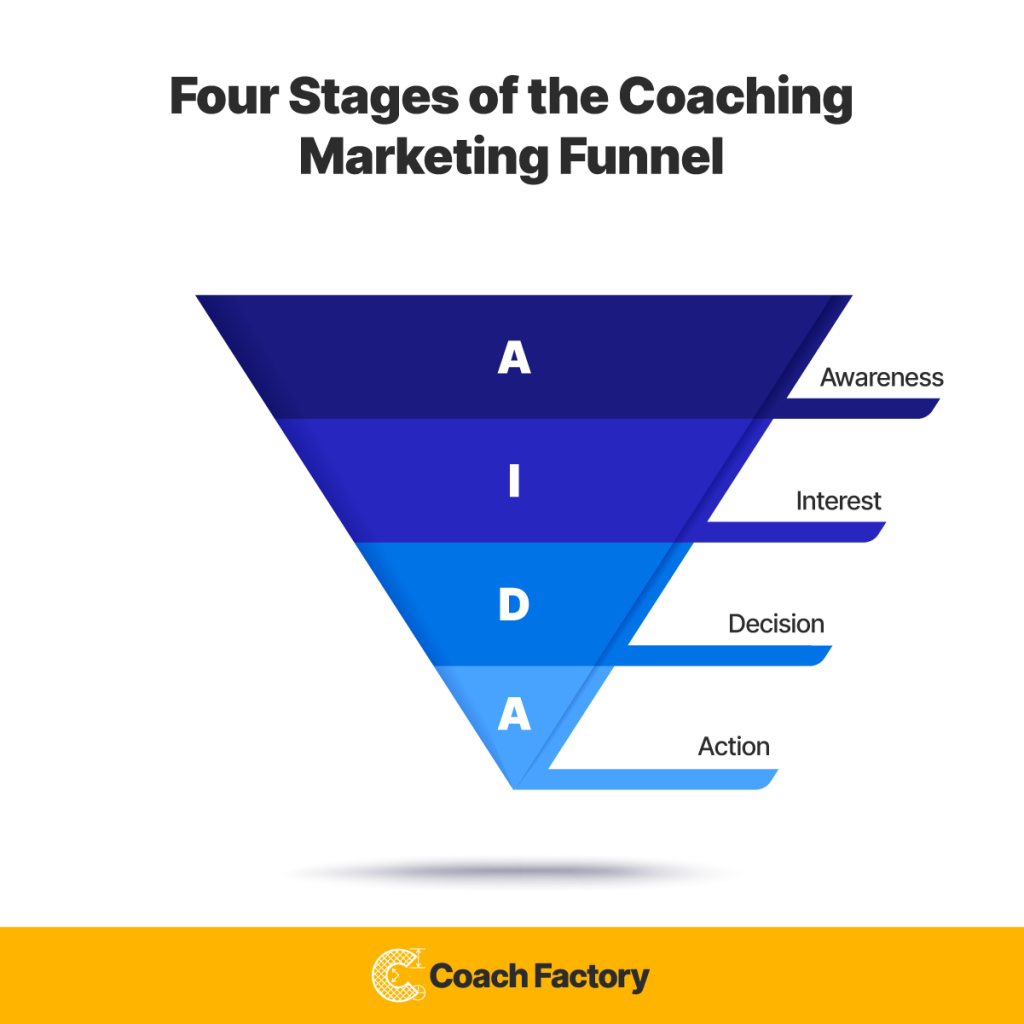
1. Awareness
The awareness stage of a coaching marketing funnel is the initial phase where potential clients come into contact with or become aware of a coach’s services or offerings. It’s where the broadest audience resides.
This stage is where you make prospects aware that a solution to their problem or need exists, and that solution might be the coaching services you offer.
A common challenge at this stage is the breadth of the audience and the shallow nature of their engagement. Only a fraction of the people in the awareness stage will move to the next stage, so it’s crucial to cast a wide net by offering a good mix of content and engagement channels to cater to different segments of this broad audience.
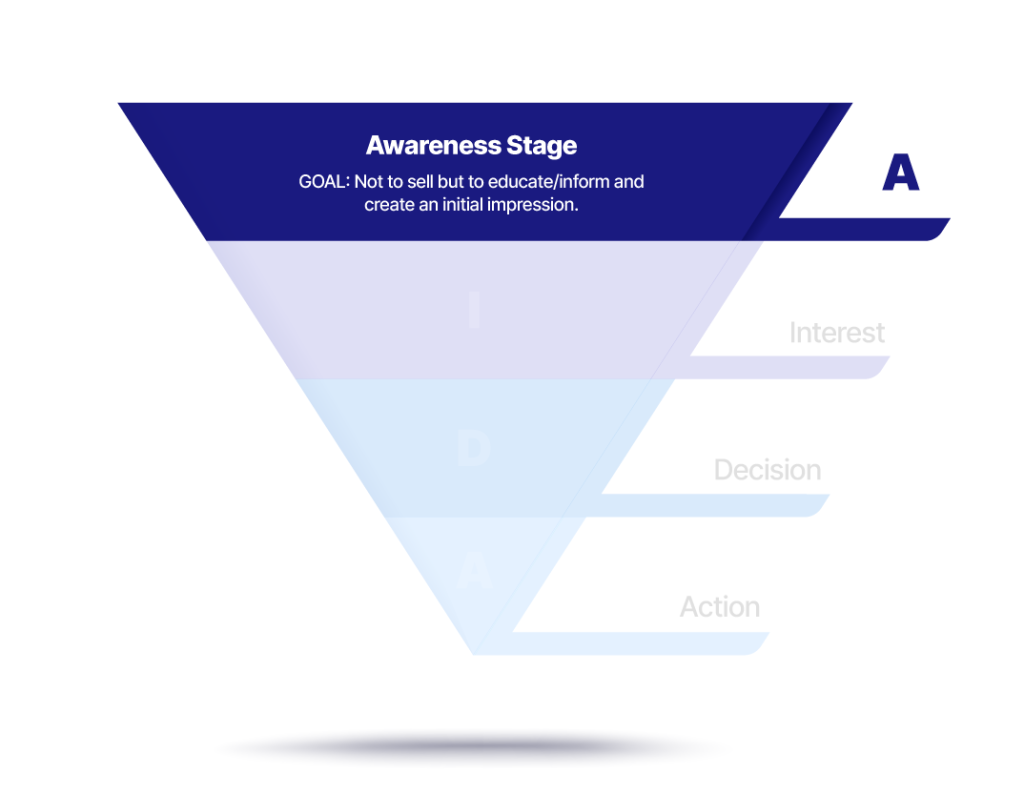
How to Market Your Coaching Business at the Awareness Stage
Maximizing the awareness stage is important because coaching is a deeply personal service. Prospects need to believe in the effectiveness of coaching in general and the specific coach’s approach, philosophy, and methods.
This stage lays the foundation for that trust. Here are four avenues of marketing at the awareness stage.
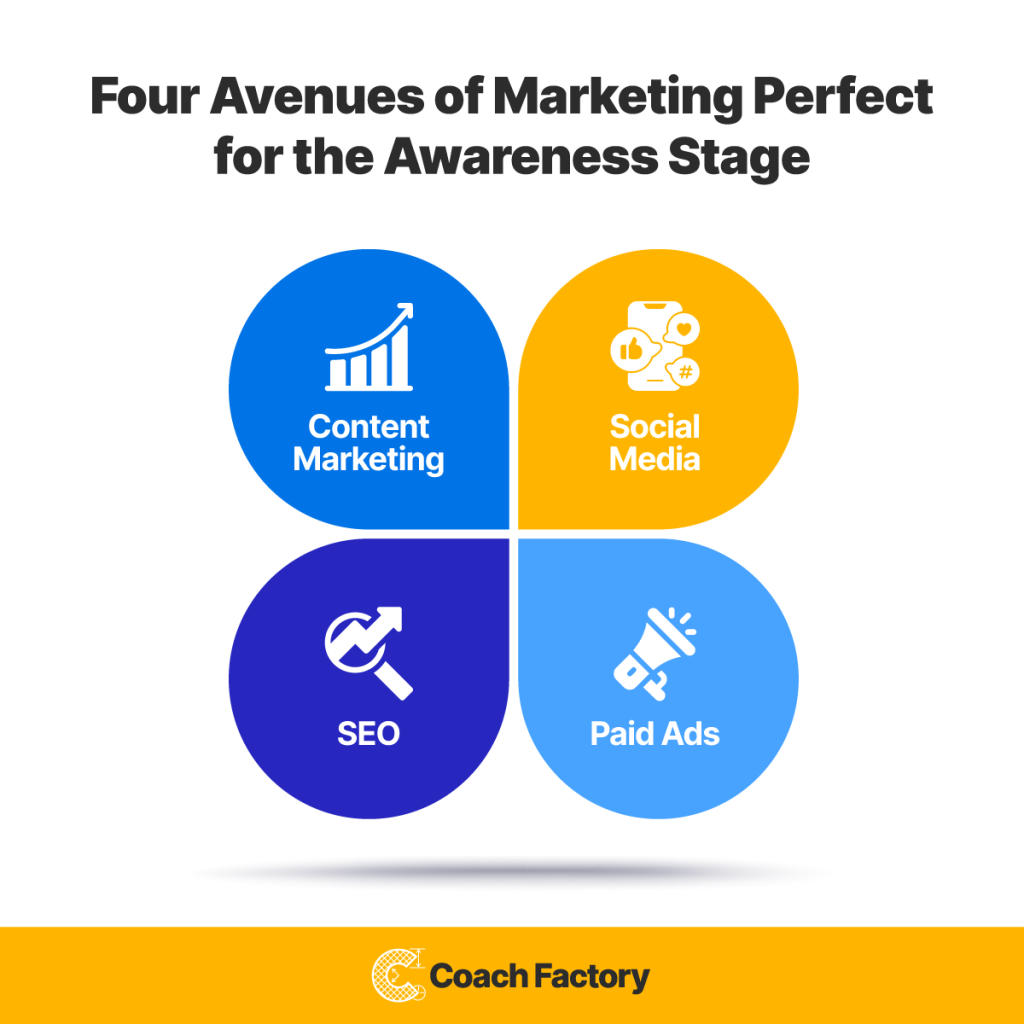
1. Content Marketing
To make the most of the awareness stage, develop a content marketing strategy that resonates with potential clients. Conduct thorough research to address their pain points and showcase your expertise. Content is a magnet because it attracts prospects to the brand by providing them with value and positioning the coaching business as an authority.
Content comes in different forms, such as blog posts, articles, videos, podcasts, or infographics. Your business’s content should always provide value, remain relevant, and seek to engage the target audience.
For example, a health coach could publish a blog post, reviewing ten top wellness apps and trackers, explaining the pros and cons of using each one in terms of working towards health goals. A business coach could launch a podcast series about how to grow your business with AI tools.
2. Social Media
The content you create for your website or other platforms should be repurposed for and shared on social media. Sharing content and joining active discussions on platforms like Facebook, Instagram, LinkedIn, and Twitter will increase visibility among potential clients while establishing your business as the go-to source for information in your speciality.
For example, health, wellness or fitness coaches can post recipe tutorials, stretching guides, and pep-talks about sticking with healthy habits on Facebook, Instagram, and TikTok. For business coaches, LinkedIn or Twitter are ideal places to demonstrate their thought leadership with pithy quips or insightful hot takes.
3.Search Engine Optimization (SEO)
To boost your content or website further, developing an SEO strategy helps your coaching business to appear higher in search engine results for relevant keywords. When someone searches for a related topic, they’ll find your content and can decide to engage.
Google’s Keyword Planner will help you find the right keywords for your niche which you can use in blog posts, for image alt tags, and on landing pages. For example, health and wellness coach might target keywords like
- online health coach for women
- how to improve my overall health
- how to eat better
- how to keep healthy eating habits
- how to stick with an exercise routine
- how to find a health coach
4. Advertisements
Running paid ads on platforms like Google, Facebook, or Instagram increases visibility among audiences who have yet to organically come across your coaching service. Unlike organic reach, which depends on chance or the virality of content, paid advertisements offer precision. They allow coaches to define audience parameters like demographics, interests, or behaviors to align their message with those most likely to benefit from their expertise.
During the ad creation process, it’s important to create a target audience that reflects your niche. Here are a few sample audiences for health, business, and life coaches:
- Health: Men and women between the ages of 25-35 with an interest in fitness and paleo eating.
- Wellness: Corporate 9-5ers between 24-54 who are seeking healthy work-life balance.
- Business: New entrepreneurs ages 45-65 who need help getting started.
- Life: Stay-at-home moms between the ages of 35-45.
Paid ad platforms provide detailed data analytics which enable coaches to track the performance of their ads in real time and understand which messages resonate best.
2. Interest
At the stage of interest, prospects get closer to understanding the coach’s methodologies and value proposition. They may subscribe to newsletters, attend webinars, or engage in preliminary discussions because they’re eager to discern how the coach might address their needs or challenges.
Engaging prospects at this stage requires strategic communication, solving their problems, and positioning the coach as the key solution to their needs. This engagement encourages a relationship and maintains their interest.
The interest stage is crucial because prospects transition from sideline audience members to active participants. Their interactions provide you with invaluable insights into their needs, objections, and preferences, helping you tailor communication and offers.
At this stage, potential clients seek more information about the coach’s methodologies, values, and success stories. They no longer passively consume content but are taking proactive steps to understand how the coach can help them. Prospects will subscribe to newsletters, read emails, download resources, attend webinars, or join community groups related to the coaching service. All of these interactions provide them with a richer understanding of what to expect.
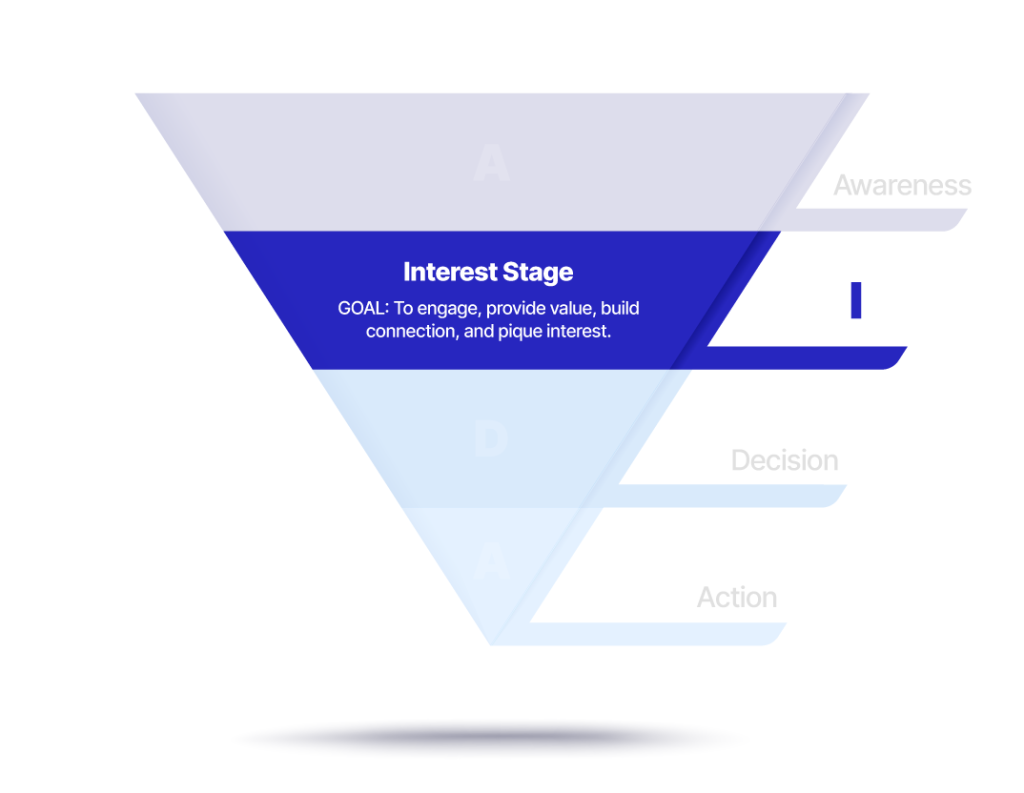
How to Market Your Coaching Business at the Interest Stage
1. Email Marketing
Email marketing is a potent tool for nurturing leads, delivering consistent, personalized content, and maintaining an open communication channel that gradually guides potential clients toward making a decision.
The power of email marketing is its ability to deliver automated and personalized content directly to a prospect, making it both intimate and effective. Every email sent is an opportunity to provide value, share insights, and deepen the relationship. Through automated sequences tailored to a prospect’s needs or behaviors, coaches ensure every interaction feels timely and relevant.
For instance, a career coach provides real value to the prospects who’ve subscribed by sending a weekly email with hot job listing sites, interview tactics, and resume tips. Remember, the more value you provide upfront, the easier it is to upsell to those subscribers in the future.
As prospective clients consume the content delivered to their inboxes, the email guides them toward the next steps of the marketing funnel — booking a consultation, joining a webinar, or even buying into a coaching program.
2. Workshops and Webinars
Workshops and webinars are invaluable tools in coaching and offer dual benefits. First, they provide an interactive medium for coaches to share knowledge, tools, and strategies. Through live sessions, participants get a tangible taste of the coach’s methodology, expertise, and approach, making it an effective sampling tool.
Secondly, workshops and webinars position the coach as an authority in their niche. By addressing pain points, answering questions in real-time, and offering actionable insights, coaches share knowledge while building trust and rapport with potential clients.
For example, it’s common for health and wellness coaches to host a weekly workshop or webinar that shares highlights from their coaching approach. This could be a session that discusses common mindfulness tools and techniques or steps for living a healthier lifestyle. The direct interaction in these sessions is more impactful than any written content or advertisement because attendees can gauge authenticity, passion, and competence firsthand.
These live events lead to profitable returns even when offered freely. Attendees who find value in the free content are more likely to consider paid services due to sampling the quality of guidance firsthand. Additionally, these events encourage networking, word-of-mouth referrals, and promote community-building.
3. Decision
The turning point happens at the decision stage of a coaching marketing funnel. This is where potential clients determine whether or not to invest in a coach’s services. After progressing from the awareness and interest stages, prospects have enough information and engagement to make an informed decision. In fact, in some marketing funnel frameworks, this stage is called desire.
It involves providing more insights into the benefits of the coaching service and showcasing tangible evidence of value and results.

How to Market Your Coaching Business at the Decision Stage
The decision stage is pivotal because it’s the precursor to action. A well-navigated decision phase increases the likelihood of conversion where the prospect transitions from a potential lead to a paying client. At this stage, prospective clients should feel assured of the value they’ll receive, the authenticity of the coach, and the potential benefits to their personal or professional life.
1. Personalized Free Discovery Call
Offering free, one-on-one discovery calls lets prospects directly communicate their concerns, desires, and goals. It provides a space for them to experience a taste of what the coaching relationship might encompass.
In these sessions, coaches offer insights or preliminary guidance tailored to the prospect’s situation. This avenue showcases the coach’s expertise and understanding, reinforcing the value of their services. Personalized consultations are pivotal in building trust which is a cornerstone in the decision-making process, especially for intimate services such as coaching.
2. Exclusive Content or Resource Access
Provide prospects with access to exclusive content that’s unavailable to the general public. This could be through e-books, guides, videos, or advanced tutorials that dive deeper into the coach’s expertise.
One common way to offer this exclusivity is through a free community-based platform on Facebook or LinkedIn, where you can control membership. Going live on a set schedule is a benefit that works well in a private group, too. Live video gives potential clients the opportunity to briefly engage with you to determine if your services are a good fit for them.
Offering high-quality, exclusive content reinforces the coach’s expertise and gives prospects a sense of the depth and value they would receive upon engagement. Providing something of value that meshes very closely with the kind of coaching you offer also invokes the principle of reciprocity. Prospects may feel more inclined to engage with the coach after receiving something beneficial.
3. Testimonials and Case Studies
Testimonials and case studies offer social proof — important for building credibility and trust. They are also an impactful way to sway the decision-making process in your favor. Tip: Include a range of testimonials that represent different demographics, various kinds of challenges, and impressive transformations that will resonate with your prospects.
While testimonials often touch upon personal experiences, case studies go a step further. They provide a comprehensive before-and-after scenario, detailing the challenges faced, the strategies implemented, and the results achieved. This narrative format lets prospects visualize their journey and see the possible outcomes.
Testimonials and case studies can be featured on your coaching website, via social media shares, and in emails.
Be sure to regularly update testimonials and case studies to include recent successes. For maximum impact, conclude testimonials and case studies with compelling calls-to-action to nudge the prospective client to take the next step — action.
4. Action
The action stage of a coaching marketing funnel is the pivotal point where a potential client finally takes a definitive step to engage with the coach’s services. This is where contemplation transitions into commitment.
This is the final chance to address last-minute concerns and the time to make the onboarding experience seamless and welcoming.
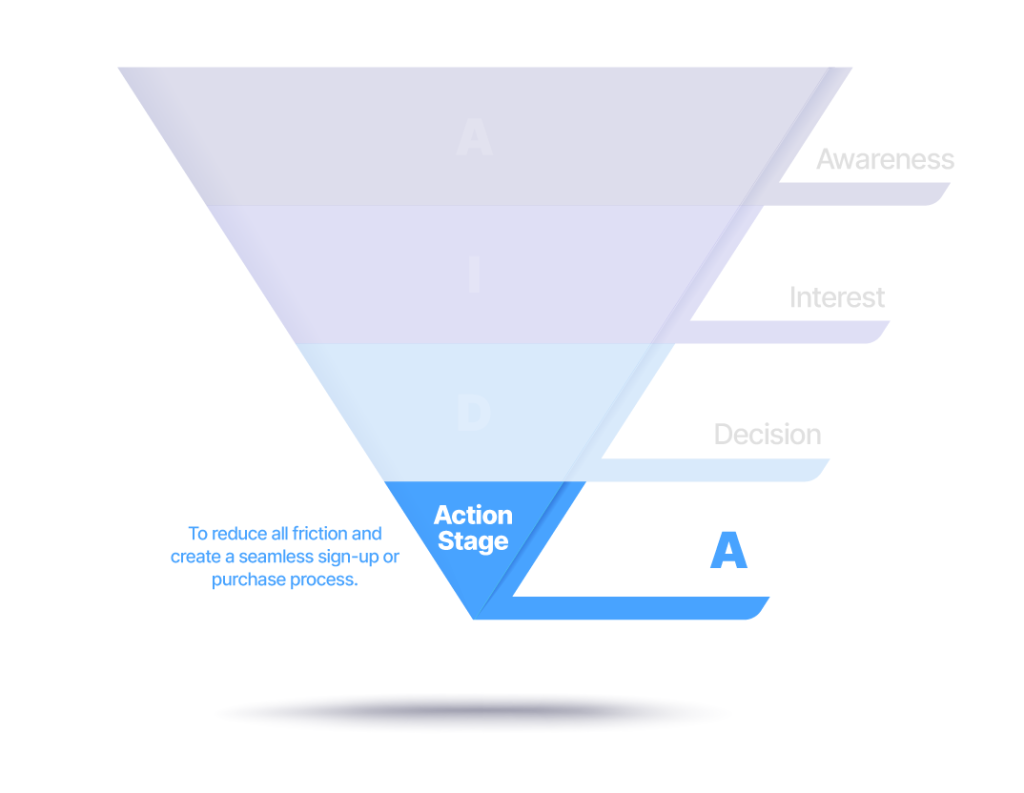
How to Market Your Coaching Business at the Action Stage
The return on investment (ROI) becomes more obvious in the action stage. An effectively managed action stage ensures that the energy, time, and resources spent nurturing the prospect through the funnel translate into concrete business results.
1. Use Compelling Calls-to-Action (CTA)
A CTA is a command that tells the prospect exactly what step they should take next. It’s the culmination of all the previous engagements and should be the most noticeable element on the page or communication.
When using calls-to-action, the language should be direct and jargon-free. For instance, “Begin Your Transformation Now” is more enticing than a nudge to “Click Here.” Avoiding jargon also makes the prospect feel confident in taking action because they understand what you ask them.
Beyond the words, the design elements — color, size, and positioning — play an instrumental role. A CTA button should stand out in high contrast to the rest of the page or email and use action words to urge the prospect to click.
2. Streamline the Sales Process
Ensuring the conversion process is as seamless and straightforward as possible mitigates potential drop-offs and easily converts prospects into clients. From the moment a potential client decides to engage, every click, every page, and every form requires optimization for ease and simplicity.
You should also minimize the number of steps required to complete a purchase or sign-up. Each additional step can deter potential clients.
3. Personal Touch
Personal messages stand out against the sea of automated, generic emails. Consider using a hand-written note, a personalized email, or a video message. Since coaching thrives on personal relationships, these small gestures work towards a fruitful coach-client relationship in the future.
A Marketing Funnel Template for Your Coaching Business
A successful marketing funnel continues beyond acquiring a client. The ultimate goal is to create loyal advocates for your coaching services. The broader your funnel’s top (awareness), the more potential clients you introduce to your coaching expertise. As prospects move down the funnel, personalized engagement and tailored content help filter in those who show genuine interest.
As the coaching landscape becomes more competitive, having a structured, data-driven, and efficient approach to marketing is a game-changer. You can get the right clients and nurture those relationships for sustained growth by integrating marketing funnels into your strategy. In the end, you’ll drive growth while boosting the reputation of your coaching business. This is the key to a solid and profitable coaching business.
